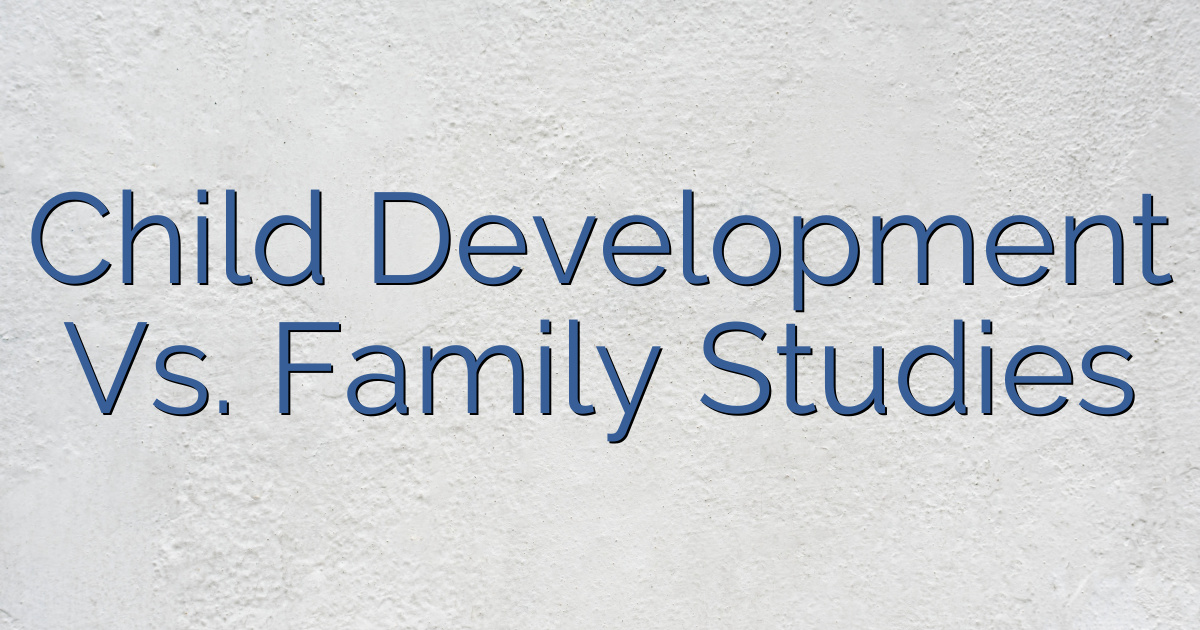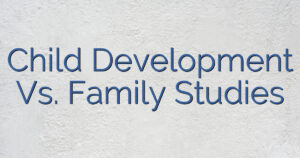
Are you torn between pursuing a major in Child Development or Family Studies? It’s time to unravel the mysteries and make an informed decision.
In this article, we’ll delve into the intricacies of these two majors, exploring their curriculum, skills development, career opportunities, and salary potential.
By the end, you’ll have a clear understanding of the similarities, differences, and factors to consider when choosing between Child Development and Family Studies.
So, let’s embark on this enlightening journey together.
Table of Contents
Key Takeaways
- Both Child Development and Family Studies offer a wide range of career opportunities in fields such as child psychology, education, social work, counseling, and more.
- The curriculum and requirements for both majors include core courses, electives, and fieldwork/internships, providing students with hands-on experience in their respective areas of study.
- Coursework and assessments in both majors focus on understanding child development and family dynamics, applying theories to real-world scenarios, and developing strong communication and observation skills.
- Salary potential in both Child Development and Family Studies varies based on education, experience, and job role, but both fields offer competitive salaries and promising career paths for making a difference in individuals’ and families’ lives.
Overview of the two majors: Child Development and Family Studies
The overview of the two majors, Child Development and Family Studies, is important for students to understand their differences and similarities. In terms of career prospects, both majors offer a wide range of opportunities in various fields.
Graduates in Child Development can work as child psychologists, educators, social workers, or even researchers. On the other hand, graduates in Family Studies can pursue careers as family therapists, counselors, human resource managers, or family advocates.
Furthermore, the impact of cultural diversity on child development and family dynamics is a significant aspect in both majors. Studying Child Development allows students to understand how cultural factors shape a child’s development, including their language acquisition, social skills, and identity formation.
In Family Studies, students explore the ways in which cultural diversity influences family structures, communication patterns, and parenting practices. Understanding these dynamics enhances professionals’ ability to provide culturally sensitive and inclusive support to children and families.
Overview of the curriculum and requirements of the two majors
Take a look at what the curriculum and requirements are for both the child development and family studies majors. The curriculum for the child development major typically focuses on child psychology, early childhood education, and developmental theories. On the other hand, the family studies major includes courses on family dynamics, interpersonal relationships, and family systems. Both majors require students to complete a combination of core courses, electives, and fieldwork or internships to gain hands-on experience. Here is a comparison of the program structures of the two majors:
| Child Development Major | Family Studies Major |
|---|---|
| Child Psychology | Family Dynamics |
| Early Childhood Education | Interpersonal Relationships |
| Developmental Theories | Family Systems |
These courses provide students with a strong foundation in their respective areas of study and equip them with the necessary skills to work with children or families in various settings.
Overview of coursework and assessments in Child Development and Family Studies programs
Explore the coursework and assessments in both majors to gain a better understanding of what you can expect in the Child Development and Family Studies programs.
In the Child Development program, you will take courses that focus on child psychology, early childhood education, and child behavior. You may also have the opportunity to participate in hands-on experiences, such as internships or practicums, where you can apply what you have learned in real-world settings. Assessments in this program may include exams, essays, and projects that require you to analyze child development theories and apply them to practical scenarios.
In the Family Studies program, you will study topics like family dynamics, marriage and relationships, and parenting. Assessments in this program may involve case studies, group projects, and presentations that require you to analyze and evaluate family dynamics and relationships.
Both programs will provide you with a solid foundation in understanding child development and family dynamics, preparing you for a variety of careers in these fields.
Comparison of Skills Developed in Child Development and Family Studies Programs
When comparing the skills you develop in the Child Development and Family Studies programs, you’ll notice that the focus in the Child Development program is on understanding children’s psychology and behavior, while the Family Studies program emphasizes studying family dynamics and relationships.
In the Child Development program, you will gain a deep understanding of child development theories, learning how to assess and support children’s cognitive, emotional, and social development. You will also learn effective communication and observation skills that are essential for working with children and their families.
On the other hand, the Family Studies program will equip you with the knowledge and skills to analyze family systems, understand the impact of various factors on family dynamics, and provide support to families facing challenges.
Both programs prepare you for a range of career opportunities in the fields of child development and family studies. According to current job market trends, there is a growing demand for professionals with expertise in child development and family studies. The salary potential in these fields varies depending on factors such as education, experience, and the specific job role.
Comparison of Career Opportunities and Job Roles in Child Development and Family Studies Programs
In comparing career opportunities and job roles in Child Development and Family Studies programs, it’s important to consider the specific skills and knowledge gained in each program.
Both fields offer diverse career paths and promising job prospects. Here are some key points to consider:
- Child Development:
- Working with children can be incredibly rewarding and fulfilling.
- Opportunities to make a positive impact on the lives of children and families.
- Careers in education, counseling, social work, and childcare.
- Growing demand for professionals in early childhood education and intervention.
- Family Studies:
- Focus on understanding family dynamics and relationships.
- Opportunities to provide support and guidance to families in need.
- Careers in family counseling, social work, and community outreach.
- Increasing demand for professionals who can address modern family challenges.
Both fields offer exciting career paths that allow you to make a difference in the lives of individuals and families.
Comparison of Salary Potential: Job Market Trends
The job market trends reveal that professionals in both fields have the potential to earn competitive salaries. In the field of child development, individuals who work as child psychologists or early childhood educators can expect to earn a median salary of around $50,000 to $60,000 per year. On the other hand, professionals in family studies, such as family therapists or social workers, can earn a median salary of approximately $45,000 to $55,000 per year. It is important to note that these figures may vary depending on factors such as experience, education level, and location. However, overall, both child development and family studies offer promising salary potential for individuals interested in pursuing a career in these fields.
| Child Development | Family Studies |
|---|---|
| Child Psychologist | Family Therapist |
| Early Childhood Educator | Social Worker |
| Median Salary: $50,000 – $60,000 | Median Salary: $45,000 – $55,000 |
Similarities between Child Development and Family Studies programs
Now that you have a better understanding of the salary potential and job market trends in child development and family studies, let’s explore the similarities in curriculum and career opportunities between these two fields.
First, both child development and family studies programs emphasize the importance of understanding human development and behavior. They both cover topics such as child psychology, family dynamics, and human relationships.
Second, the career opportunities in both fields are quite diverse. Graduates from both child development and family studies programs can pursue careers as child life specialists, family therapists, social workers, or early childhood educators. Both fields offer opportunities to make a positive impact on the lives of children and families.
Difference between Child Development and Family Studies majors
To better understand the distinction between the two majors, you’ll find that child development focuses more on individual development and behavior, while family studies emphasizes the dynamics and relationships within a family unit.
In terms of curriculum, child development programs typically offer courses that delve into the physical, cognitive, and social development of children. Students learn about various theories and research findings related to child development, as well as practical skills for working with children and families.
On the other hand, family studies programs place more emphasis on understanding the complexities of family dynamics, communication patterns, and the impact of societal factors on family functioning. This includes courses on marriage and family relationships, parenting, and family therapy.
In terms of career opportunities, child development majors often pursue careers in early childhood education, child care, or child advocacy, where they work directly with children and families. Family studies majors, on the other hand, may find employment in fields such as family therapy, counseling, social work, or family policy and advocacy. These professionals work with families and individuals to improve their overall well-being and address issues related to relationships, parenting, and family dynamics.
Both majors offer rewarding career paths that allow individuals to make a positive impact on the lives of children and families.
Factors to consider when choosing between the two majors: interests
When deciding between the child development and family studies majors, it’s important to consider your personal interests and what aspects of working with children or families you are most passionate about. Here are three factors to consider when making your decision:
- Career prospects: Take into account the job opportunities available in each field. Child development majors often work in education, counseling, or research, while family studies majors may find careers in social work, non-profit organizations, or family therapy. Research the job market and consider which path aligns with your long-term career goals.
- Personal values: Reflect on your personal values and what you find meaningful. Child development majors focus on understanding child development and promoting their well-being, while family studies majors study family dynamics and relationships. Consider which area resonates more with your values and interests.
- Passion for working with children or families: Think about which population you are most drawn to. Are you more passionate about working directly with children or are you more interested in supporting families? Reflect on your experiences and consider which field excites you the most.
Conclusion
Congratulations on reaching the end of this informative journey comparing Child Development and Family Studies!
Now that you’ve explored the similarities and differences between these two majors, you have a clearer understanding of the unique skills and career opportunities they offer.
With this knowledge in hand, you can confidently make an informed decision about which path aligns best with your interests and aspirations.
So go forth and embark on your chosen journey, knowing that you have the tools to nurture and support the growth of individuals and families in a euphoric and fulfilling way.

